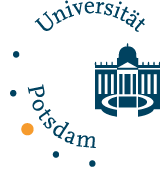Biographie
Ausbildung:
2023: Approbation zum Psychologischen Psychotherapeuten (Verhaltenstherapie), DGVT Berlin
2018: Dr. Phil. in Psychologie (Magna cum laude), Universität Potsdam
2014: Master in Psychologie mit Schwerpunkt klinische Psychologie, Universität Potsdam
Wissenschaftliche Laufbahn
2015 – 2019: Doktorand, Abteilung Allgemeine und biologische Psychologie , Universität Potsdam, Prof. Dr. Ralf Engbert
2012 – 2014: Studentische Hilfskraft in allgemeiner und biologischer Psychologie Prof. Dr. Ralf Engbert, 2012-2014,
Universität Potsdam
2011-2012: Studentische Hilfskraft in der PIER Studie, Beratungspsychologie, Prof. Dr. Petra Warschburger, Universität Potsdam
Klinische Berufserfahrung
2021 – 2023: Ambulanter Psychotherapeut (in Ausbildung) in psychotherapeutischer Gemeinschaftspraxis in Berlin, Kreuzberg
2020: Psychotherapeut in Ausbildung in der medizinischen Klinik für Psychosomatik der Charité Berlin
2019-2020: Psychotherapeut in Ausbildung an der Rehabilitationsklinik LAGO des Drogentherapiezentrums Berlin
2019-2020: Psychologe beim Online-Beratungs Anbieter Selfapy
2011-2014 Klinische Praktika (z.B. in der Angstambulanz der Charité, Berlin)
Lehrerfahrung
2023/2024 Seminar spezielle Krankheits- und Verfahrenslehre Universität Potsdam
2022-2024 Vorlesung allgemeine Psychologie an der Sigmund-Freud-Universität Berlin
2022-2023 Vorlesung Biopsychologie und Neurowissenschafften an der Sigmund-Freud-Universität Berlin
2016 Seminar Neuropsychologie Universität Potsdam
Publikationen
Schwetlick, L., Rothkegel, L. O. M., Trukenbrod, H. A., & Engbert, R. (2020). Modeling the effects of perisaccadic attention on gaze statistics during scene viewing. Communications biology, 3(1), 727
Krügel, A., Rothkegel, L. O. M., & Engbert, R. (2020). No exception from Bayes’ rule: The presence and absence of the range effect for saccades explained. Journal of vision, 20(7), 15.
Backhaus, D., Engbert, R., Rothkegel, L. O. M., & Trukenbrod, H. A. (2020). Task-dependence in scene perception: Head unrestrained viewing using mobile eye-tracking. Journal of vision, 20(5), 3.
Schütt, H. H., Rothkegel, L. O. M., Trukenbrod, H. A., Engbert, R., & Wichmann, F. A. (2019). Disentangling bottom-up versus top-down and low-level versus high-level influences on eye movements over time. Journal of vision, 19(3), 1.
Rothkegel, L. O. M., Schütt, H. H., Trukenbrod, H. A., Wichmann, F. A., & Engbert, R. (2019). Searchers adjust their eye movement dynamics to target characteristics in natural scenes. Scientific Reports, 9 (1): 1635.
Rothkegel, L. O. M., Trukenbrod, H. A., Schütt, H. H., Wichmann, F. A., & Engbert, R. (2017). Temporal evolution of the central fixation bias in scene viewing. Journal of vision, 17(13), 3.
Schütt, H. H., Rothkegel, L. O. M., Trukenbrod, H. A., Reich, S., Wichmann, F. A., & Engbert, R. (2017). Likelihood-based parameter estimation and comparison of dynamical cognitive models. Psychological Review, 124 (4), 505–524.
Rothkegel, L. O. M., Trukenbrod, H. A., Schütt, H. H., Wichmann, F. A., & Engbert, R. (2016). Influence of initial fixation position in scene viewing. Vision research, 129, 33-49.
